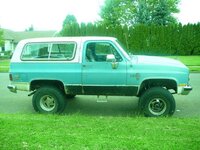Gold Supporter
Bronze Supporter
- Messages
- 12,938
- Reactions
- 47,210
- Thread Starter
- #21
Large or small?
Full size pickup - your Dodge recommendation (or equivalent) looks to be spot on with what I was looking for
Budget?
Depends on the vehicle, but I'm going to start pricing the 2500/3500 6BT and doing homework on known issues/critical components.
What do you consider "reasonable" for towing? I.E., what do you want to tow with it, how far, how often?
I'd like to be able to tow a camping trailer, horse trailer, or a load of wood with a loaded bed. Not often unless SHTF happens, but would rather have the truck not break a sweat when I want it to hump something heavy up a hill.
Excellent writeup Heretic!!! Lots of very useful info, and you helped a lot with questions I had about the Cummins diesel (was reading this: Cummins Diesel Motor - Diesel Power Magazine while you were posting).












